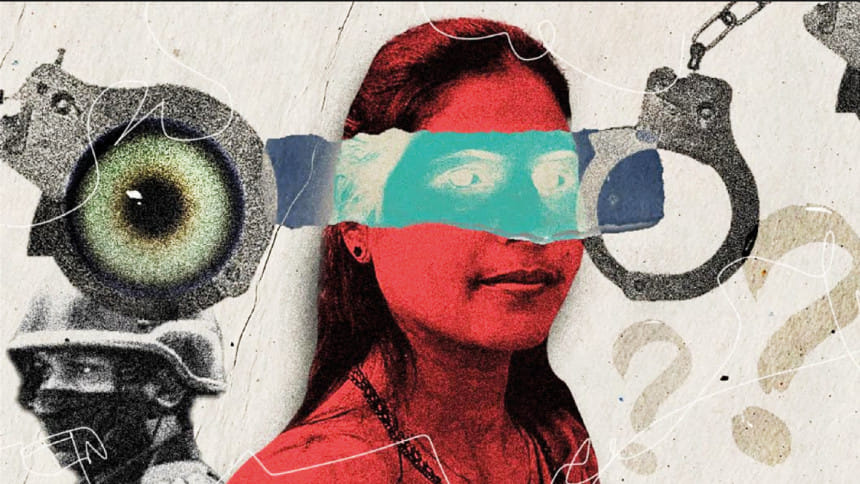Some unanswered questions in Sultana Jasmine’s death

Custodial torture and death continue to be infamy in the criminal justice system of Bangladesh. Despite the presence of constitutional safeguards and legislative provisions, this gross violation of human rights persists to cover headlines. As per a report of Ain o Shalish Kendra (ASK), 1,426 incidents of custodial deaths took place from January 2017 to July 2020. A recent addition to this grim statistics is the death of Sultana Jasmine, an employee of Naogaon Union Land Office, allegedly in the custody of Rapid Action Battalion (RAB) on March 24.
Starting from Sultana's arrest, there has been a perpetual violation of due process rights. According to media reports, she was picked up on March 22 by RAB officials. One of the pieces published on 30 March in The Daily Star titled "How did Sultana Jasmine die?" unravels that she was sued under the Digital Security Act 2018 more than 31 hours following her detention by RAB. In a writ petition filed seeking judicial inquiry into the matter, the High Court Division questioned under what authority she was picked up without her being an accused at the time, who interrogated her, and whether she sustained any fresh wounds after she was being detained. The Court also questioned the jurisdiction of RAB to pick anyone up without any formal complaints. The director of Rajshahi Medical College Hospital stated that Sultana was brought in critical condition on March 24, and she died with her already deteriorating health. Multiple intracranial bleeds and external injuries were found on her head. However, RAB officials claimed that Sultana died from a stroke. On the contrary, her family members have repeatedly asserted that Sultana was in perfect health prior to her arrest. The autopsy report handed over on April 3 divulged that she died of shock due to excessive brain hemorrhage.
Articles 33 and 35 of the Constitution lay down the safeguards regarding arrest and detention, and trial and punishment. Bangladesh enacted the Torture and Custodial Death (Prevention) Act 2013 in compliance with the Convention against Torture and Other, Cruel, Inhuman or Degrading Treatment or Punishment 1984. The Act mentions two core offences, firstly, torture by a law enforcement officer, and secondly, custodial death due to torture. Section 2(6) of the Act defines torture as physical or psychological torture that hurts and mentions specific criteria like extorting confession, punishing or intimidating any suspected person, etc. It covers the death of a person in custody of a public officer, the death of any person during illegal detention, or death during arrest or interrogation as custodial death. Though the Act provides easy avenues of complaint and investigation, victims or their relations still fear seeking remedies against law enforcement agencies.
The Act mentions in section 5(5) that the investigation will be conducted by a police officer superior to the accused officer. The proviso of section 5(2) states that the court may authorise a judicial inquiry upon satisfaction of an application by an aggrieved person that a fair investigation is not possible by the police. The sole verdict till now under this Act has been against three police officials for the death of Ishtiaque Hossain Jonny. It is pertinent to mention that the victim's family was able to secure a judicial inquiry.
The higher judiciary of Bangladesh has provided many landmark judgments concerning the issue of arbitrary arrest, custodial torture, and death. In BLAST v Bangladesh (2003) 55 DLR 363, the Hight Court Division issued 15 directives to be followed in the arrest, detention, remand, investigation, and treatment of suspects. The Court also suggested shifting the burden of proof in custodial death cases to law enforcement agencies. The Appellate Division upheld the decision of the Hight Court Division on 24 May 2016. In the case of Human Rights and Peace for Bangladesh (HRPB) v Government of Bangladesh, the High Court Division directed RAB to comply with the provisions of the Code of Criminal Procedure 1898 while arresting any citizen and to ensure the safety of persons detained in their custody.
Custodial torture contravenes due process of law. The breach of procedural requirements in Sultana's arrest and the imputations raised by her family remain to be answered. Sultana's death has also made us ask some questions which are yet to be answered by the concerned stakeholders. When will citizens be protected from oppression at the hands of law enforcement agencies? When will the judicial directives pertaining to custodial protection be strictly complied with? It reminisces the empathetic observation by the High Court Division in AHM Abdullah v State and others (2005) 25 BLD 384 that ordinary citizens often lack the resources and ability to protest against police excesses and to seek court's redress.
The Writer is an Official Contributor, Law Desk, The Daily Star.

 For all latest news, follow The Daily Star's Google News channel.
For all latest news, follow The Daily Star's Google News channel. 



Comments